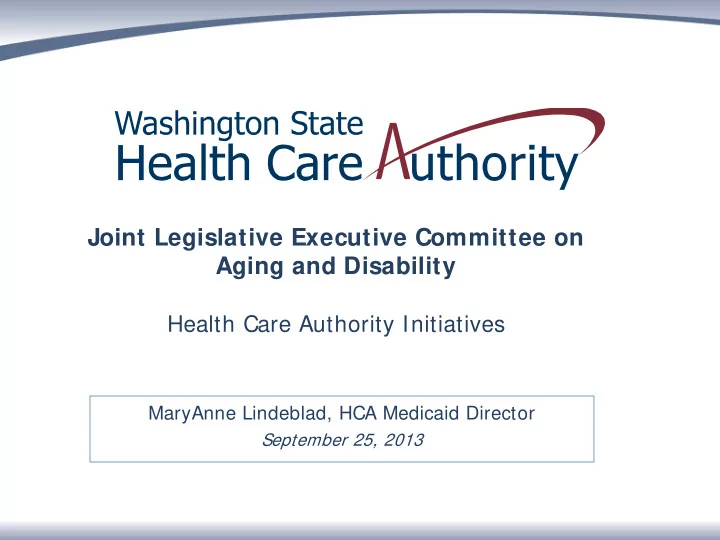

Joint Legislative Executive Committee on Aging and Disability Health Care Authority Initiatives MaryAnne Lindeblad, HCA Medicaid Director September 25, 2013
Washington State Medicaid Challenges • Medicaid delivery system silos Managed care, fee-for-service County-based behavioral health Dual-eligibles (Medicare & Medicaid) Long-term services and supports • Fragmented service delivery & lack of overall accountability • Service needs and risk factors overlap in high-risk populations • Incentives and reimbursement structures not aligned to achieve outcomes 2
Medicaid Initiatives • Three major cross administration initiatives: Transition blind and disabled populations into managed care Health Homes Duals Strategies (Medicare & Medicaid) • Initiatives designed to provide integrated and coordinated care for clients served by State programs • Focus on high-risk populations and clients with complex care needs 3
Transition Blind and Disabled Populations into Managed Care • To promote coordination of care for Medicaid enrollees, HCA has transitioned Medicaid populations from fee-for- service to coverage by a Healthy Options health plan. • Phased in enrollment into managed care for disabled and blind populations began July 2012 • Program evaluation is under way as part of the 1915b waiver evaluation. 4
Health Homes Goals: Person-centered health action goals to improve health, health-related outcomes Coordinate across the full continuum of services and ensure care transitions Facilitate delivery of evidence-based health care services Increase self-management of health goals Single point of contact responsible to bridge systems of care 5
Health Homes • Health homes are a natural vehicle to align delivery of care and provide an array of care coordination activities based on client need. • Primary care health homes and community-based health homes (mental health centers, aging networks, other community providers). • Managed care plan Health Home requirements began in July 2013; Health Homes for FFS clients rolled out July 1 through October 2013. • Increased federal financing and state match enhancement will be used to leverage FFS health home individuals. 6
Duals Strategies • Collaborative effort by DSHS and HCA to design innovative care models for individuals eligible for both Medicare and Medicaid. • Washington one of 15 participating states. • Seeks shared savings with Medicare, but real goal to improve care. • Strategy 1 : Health homes, enhanced integration and coordination of care, began mid-2013. • Strategy 2 : Full managed care benefit package integrated care pilots in King and Snohomish Counties to begin in 2014. Three way contract with CMS Two participating plans: Regence and United 7
Does the State Health Care Innovation Plan Have the Potential to Influence Improvements? • Reduce “Medicaid delivery system silos” – The state plan is being developed to focus on payment reform and a whole-person approach to care that mitigates silos and connects physical and behavioral health, with a goal of improving the long-term health outcomes of Washingtonians at reduced cost – Reducing the number of chronically ill through better health outcomes has the potential to reduce the amount of Medicaid services needed as our state’s population ages • Reduce “fragmented service delivery” & “improve accountability” – The state plan is being developed in part to reduce fragmentation and to improve accountability 8
For More Information: MaryAnne Lindeblad (360) 725-1863 maryanne.lindeblad@hca.wa.gov 9
Recommend
More recommend